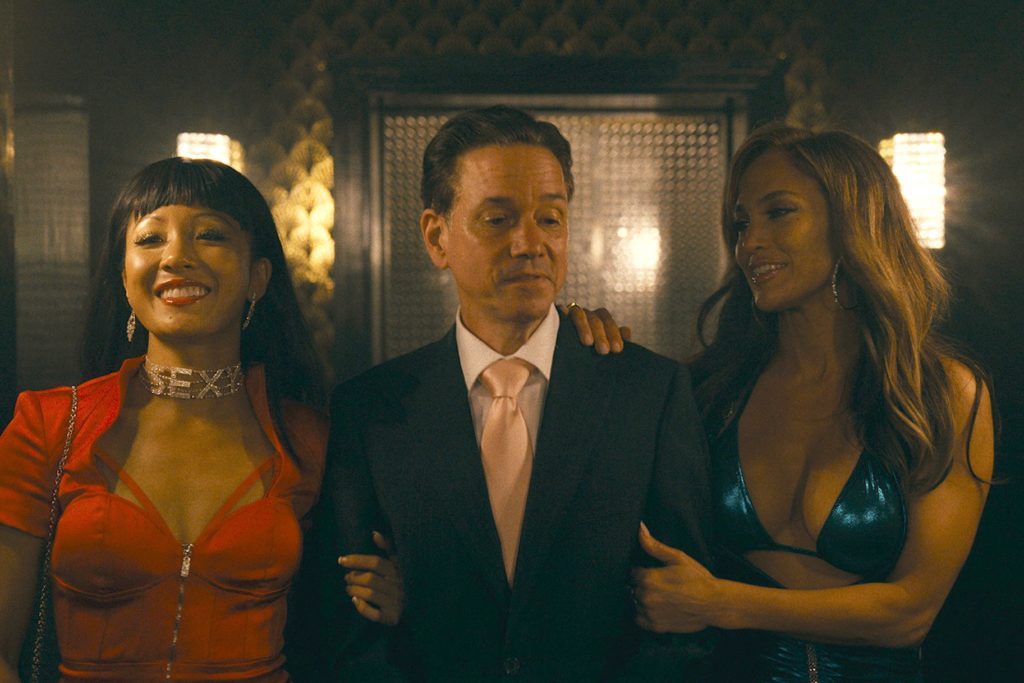Hustlers opens in 2007 with an experienced stripper named Ramona, played by Jennifer Lopez, who mentors a novice stripper named Destiny, played by Constance Wu. The two become best friends and refer to themselves as “hurricanes” because they are so successful.
After the financial crisis of 2008, the pair of hurricanes no longer have enough patronage at the strip club. Under Ramona’s guidance, the two begin to “fish” for men outside the club. They bring the men back to the strip club intoxicated and run up large bills of which the club provides a cut.
To make the scam more reliable, Ramona suggests drugging the men. They begin to do so with a mixture of ketamine and MDMA — a special concoction that apparently erases the men’s memory. Things go well until they do not.
Hustlers is told through flashbacks with narration from Destiny, who is being interviewed about her experience. This narrative style is similar to films such as Goodfellas or The Wolf of Wall Street. While those two films are fast paced — intense and edited in a way that they could be music videos — Hustlers, on the contrary, drags as if moving through deep sludge.
Constance Wu as Destiny does little to add momentum to the film. Wu never makes Destiny’s transformation from awkward newbie to accomplished stripper noticeable. Her further transformation into savvy criminal is even harder to believe. Wu never seems comfortable in her role, and the outfits she wears seem more like costumes. Looking the same no matter what is happening on screen, Destiny is like a cardboard cut-out, which makes it hard to feel invested in the stakes she faces by continuing the hustle.
A diverse demographic of women is represented in the cast of Hustlers; however, none are given enough time individually on screen to add depth to the film. Any preparation done to make the strip club realistic is lost, and by not including the other strippers enough, a varied women’s perspective is not expressed. Not taking full advantage of the diverse cast was a missed opportunity.
Jennifer Lopez is beyond the saving grace of the film: she is the entire movie. Any Oscar buzz around Lopez right now is completely deserved. Ramona is a complex character, both apparently immoral while incredibly loyal to other strippers, with whom she selflessly shares her success. Lopez does all of this effortlessly.
Stripping in 2019 has changed from what it was in decades past. Strippers are finding more freedom and autonomy, panic buttons are being installed in private rooms, and steps are taken to ensure they keep the money they earn on the floor. Hustlers, set between 2007–2014, avoids exploring these modern changes.
When Destiny can find no other work and returns reluctantly to the club, the film perpetuates the myth that sex work is only chosen as a last resort. This subtle mechanism leads viewers to expect that once the women can no longer strip they will turn to crime. This counters the women empowerment narrative as it restrains their freedom of choice.
The film captivates viewers with the reversal of gender roles. Hustlers shows all men as predators, then shifts the paradigm, making the women predators and the men their prey. The strongest call to the empowerment of women is that Hustlers provides an overwhelming abundance of exclusively women on screen. There are no male heroes, not one good man in Hustlers. This is a welcome change.
Different themes are chosen and then abandoned throughout Hustlers. In the end, the movie is less about sex and bonds between women than it is about money. The film examines latter day capitalism and the power struggle it creates. Ramona has a deep understanding of these dynamics and shares them with the audience. In the end, Ramona says “You have people tossing the money and people doing the dance.” No matter what, Ramona is never being hustled.



























